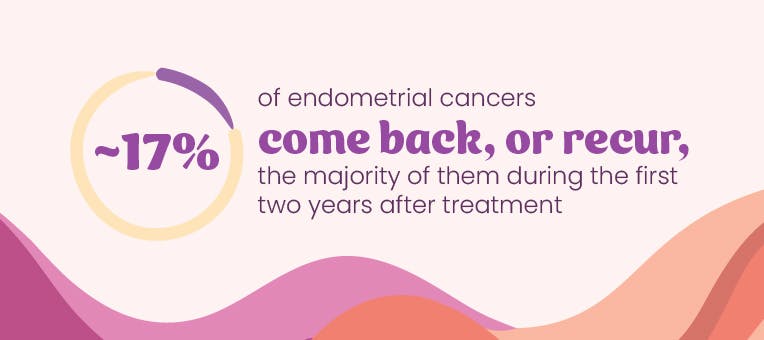You are about to leave OurWayForward.com.
You are about to leave a GSK website. By clicking this link, you will be taken to a website that is independent from GSK. The site you are linking to is not controlled or endorsed by GSK and GSK is not responsible for its content.
What Comes Next After an Endometrial Cancer Diagnosis
Returning to normal after an endometrial cancer diagnosis—whether during treatment or in remission—can be challenging. It’s natural to feel uncertain about what comes next but there are steps you can take to try to bring more brightness to your days. Living with endometrial cancer can be challenging, but taking time to reflect on your needs and set personal goals may help provide motivation. By focusing on what inspires you, you may be able to cultivate more positivity and strength in your daily life.

Make Healthy Choices
Moving your body, maintaining a healthy diet, staying hydrated, and getting rest is important. Work with your doctor to determine what's appropriate for you.

Reach Out
You don’t have to go through this experience alone. Develop a support team that can help you along the way by reaching out to:
- Professional help (e.g., a counselor or therapist)
- Family and friends
- Other people with cancer (through online forums, gynecologic cancer events, etc.)
- Endometrial or gynecologic cancer advocacy groups, which can provide:
- Emotional support
- Education for you and your caregiver(s)
- Financial assistance
- Connection to other people living with gynecologic cancer

Honor Your Feelings
Living with endometrial cancer can make you feel a variety of emotions: frustration, sadness, guilt, and exhaustion, to name a few. Give yourself permission to feel your emotions.
- Remember that feelings don’t define who you are.
- Pay close attention to your feelings and recognize what triggers them. This will help you better understand these feelings should they arise again.
- Make sure to reach out to your support system. Stay in close contact with your support group, caregivers, and doctor and let them know how you’re feeling.

Practice Resilience
This is not an easy thing to do, by any means. Taking steps to find your new normal after experiencing a setback or tough situation is invaluable when facing gynecologic cancer.
- When you’re feeling down or when things don’t go as planned, it’s important to let yourself feel whatever emotions arise.
- After you’ve honored your feelings, it’s equally important to try to get back into a routine.
- As you are doing so, try to stay present and hopeful. Creating connections is a great way to keep yourself in the moment.
- If it’s helpful, make lists and/or action plans to organize your days.

Endometrial Cancer Recurrence
For many people with endometrial cancer, treatment may eliminate or destroy the cancer. However, there is a possibility that it can come back, or recur, after it’s been treated. Endometrial cancer can come back in the uterus, pelvis, lymph nodes, or other parts of the body.
The possibility of your endometrial cancer returning can be scary. You may feel anxious or uncertain about what to do next, even if your cancer is currently in remission. Understanding what recurrent endometrial cancer means is an important step in choosing the right treatment plan with your healthcare team and managing the emotions that come along with it.
After treatment, regular screening is recommended to detect recurrence. Talk to your healthcare team about routine gynecologic care and pelvic exams.
Talk to Your Healthcare Team About Endometrial Cancer
The questions below can help kick off meaningful discussions about treatment and recurrence with your healthcare team:
- What treatment options exist after I respond to my initial treatment?
- Could treatment be right for me?
- What do I need to know about my available treatment options? How do they work?
- How frequently should I come in for check-ups to monitor my disease?
- Why would my cancer recur?
- Are there symptoms I should look out for that would signal a recurrence?
- What are my chances of recurrence, and are there treatment options available that may help to delay the cancer from returning?

Want more help starting discussions about endometrial cancer with your healthcare team?
